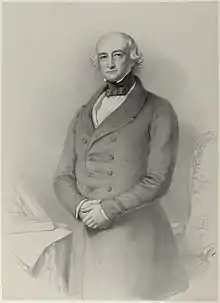Sir James Hogg, 1st Baronet
Sir James Weir Hogg, 1st Baronet (1790 – 27 May 1876) was an Irish-born businessman, lawyer and politician, who served in England as a Liberal Conservative Member of Parliament

Background and education
Hogg was born in Lisburn, County Antrim, Ireland, the eldest son of William Hogg and his wife Mary, née Dickey. He was educated at Dr Bruce's Academy, Belfast, and later at Trinity College Dublin, where he was elected a Scholar.
Legal and political career
He was called to the Bar and proceeded to India in 1814, where he obtained a large and lucrative practice. In 1822 he accepted the appointment of Registrar of the Supreme Court of Judicature, Calcutta, which he held until his return to England in 1833. In 1839 he was elected a Director of the East India Company.
He was elected MP for Beverley in 1834, and represented Honiton from 1847 to 1857, which seat he lost by two votes at the general election that year. Hogg was twice Chairman of the East India Company, and in 1858 when the government of India was transferred to The Crown he was elected member of the Council of India, until his resignation in 1872, aged eighty two. He was created a Baronet, of Upper Grosvenor Street in the County of London, in 1846, and was offered the posts of Judge Advocate General (United Kingdom) and the Governorship of Bombay, both of which he refused.
Family
Hogg married on 26 July 1822, Mary, the daughter of Samuel Swinton of Swinton House, Swinton, Berwickshire (see Clan Swinton). He successfully brought a libel action against Barnard Gregory for publishing an accusation in The Satirist that his wife was legally married to another man.[1] Sir James and Lady Hogg had fourteen children. On his death in 1876, he was succeeded in the baronetcy by his son Sir James Macnaghten Hogg, who, on 5 July 1887, was created Baron Magheramorne, of Magheramorne in the County of Antrim, in the Peerage of the United Kingdom, as part of the celebrations for the Golden Jubilee of Queen Victoria. Hogg's seventh son Quintin Hogg was a merchant and philanthropist and the father of Douglas Hogg, 1st Viscount Hailsham and Sir Malcolm Hogg, who also served on the Council of India, and grandfather of Quintin Hogg, Baron Hailsham of St Marylebone. He died in 1876, aged 85–86.
References
- Rees, Joan (1985), Shelley's Jane Williams, London: William Kimber, p. 152, ISBN 978-0-7183-0549-9
- Obituary, The Times, 29 May 1876; pg. 12; Issue 28641; col E. "The Late Sir James Hogg".
- Leigh Rayment's list of baronets
- Leigh Rayment's Historical List of MPs
External links
- Hansard 1803–2005: contributions in Parliament by Sir James Hogg
| Parliament of the United Kingdom | ||
|---|---|---|
| Preceded by Henry Burton Hon. Charles Langdale |
Member of Parliament for Beverley 1835–1847 With: Henry Burton 1835–1837 George Lane-Fox 1837–1840 Sackville Lane-Fox 1840–1841 John Towneley 1841–1846 |
Succeeded by John Towneley Sackville Lane-Fox |
| Preceded by Hugh Duncan Baillie Forster Alleyne McGeachy |
Member of Parliament for Honiton 1847–1857 With: Joseph Locke |
Succeeded by Joseph Locke Archibald Stuart-Wortley |
| Baronetage of the United Kingdom | ||
| New creation | Baronet (of Upper Grosvenor Street) 1846–1876 |
Succeeded by James Macnaghten McGarel-Hogg |